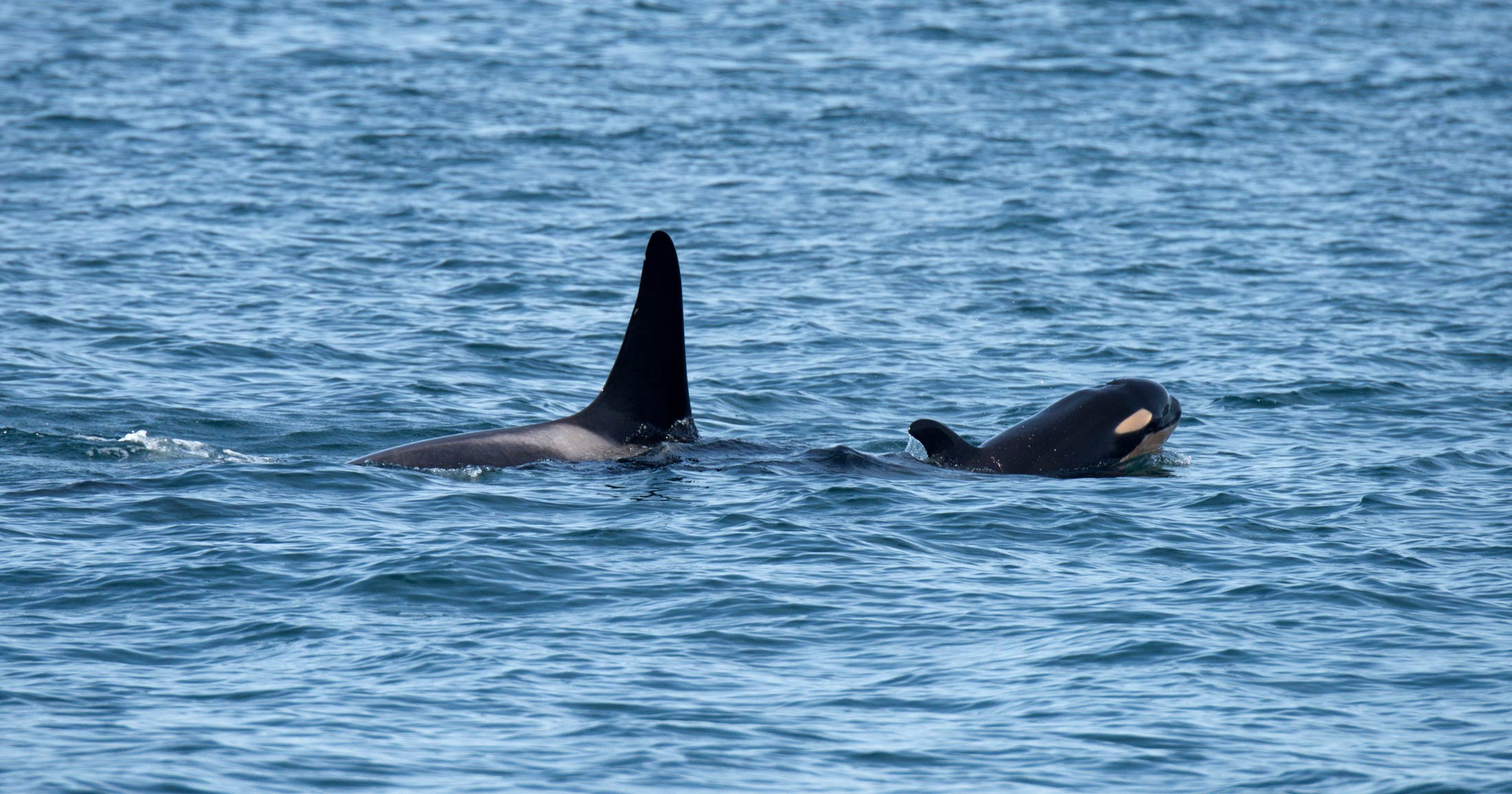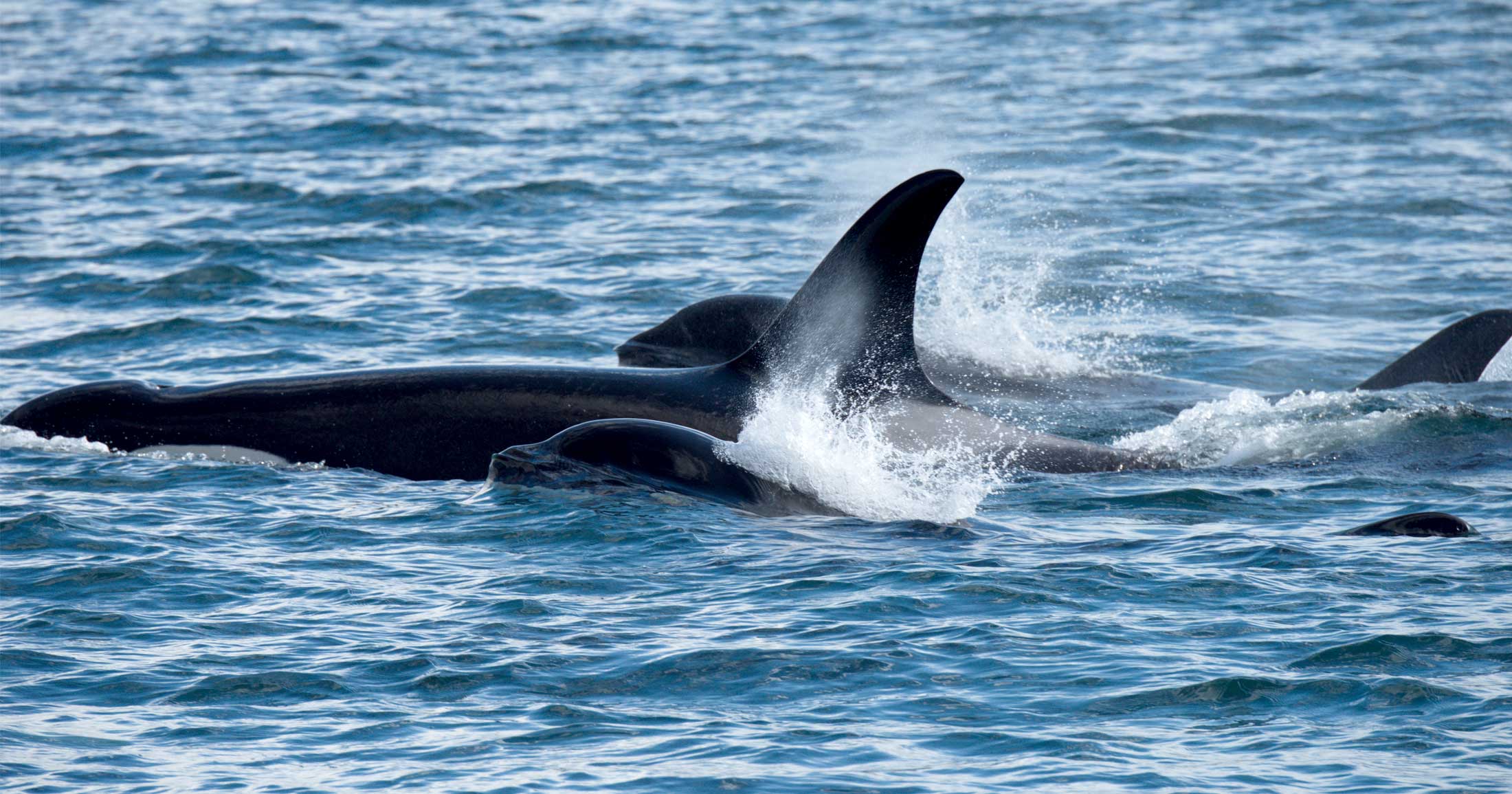There is still time to save endangered killer whales
Help us communicate the urgency of an emergency order to protect Southern Resident killer whales under section 80 of the Species at Risk Act (SARA).
In the summer of 2018, Tahlequah (J35) captured global attention when she carried her dead newborn calf for more than two weeks through the Salish Sea. Her heartbreaking display of grief served as a stark warning about the fragile state of the Southern Resident killer whale population and the threats to its viability.
Fast forward seven years. Tahlequah has lost another calf. At the time of writing, she has surpassed her previous 17-day mourning period. Concern is growing for her welfare, as her health before the birth was already compromised.
Alone in her grief: Gregor Craigie, On The Island, CBC Radio
Alone in her grief: Gregor Craigie, On The Island, CBC Radio, spoke with Lance Barrett-Lennard about the Southern Resident killer whale, J35, who is carrying a dead calf. CBC On The Island.
Over the ensuing seven years, we had the opportunity to address the threats faced by Southern Residents within their heavily fished, noisy and polluted waters, but effective action to reduce these problems has been lacking. Worse, the federal government approved new megaprojects on or affecting the coast, including the Trans Mountain Expansion Project and Terminal 2 at Roberts Bank, despite acknowledging that doing so would increase underwater noise, further disrupting the whales’ ability to feed on Chinook and other salmon.
This week, hopes for stronger protections under Canada’s endangered species laws were further dashed. Our legal challenge to stop the approval of the Roberts Bank shipping terminal expansion was dismissed, with the judge ruling that the federal cabinet’s decision met the letter of the law.
This ruling comes on the heels of a 2024 analysis by Raincoast and our partners that concluded current conditions in critical habitat pose an extremely high risk of extinction. We are running out of time to turn this situation around.
An 11th hour call for action
The Southern Residents are approaching their lowest population count ever recorded.
The most recent monitoring of their body condition in 2024 indicates that a significant portion of the population– 14 individuals–are in poor condition, making them two to three times more vulnerable to mortality. Despite evidence that the existing conservation measures are insufficient, little progress has been made to strengthen or expand them.
In 2024, Raincoast and its partner NGOs worked with Ecojustice to submit a petition to the Honourable Dianne Lebouthillier, Canada’s Minister of Fisheries and Oceans, and the Honourable Steven Guilbeault, Minister of Environment and Climate Change. The petition calls for an emergency order under section 80 of the Species at Risk Act, to enact stronger protective measures for the Southern Resident killer whales.
We recommended 13 actionable, necessary measures informed by the best available science, and aligned with the objectives outlined in the federal Recovery Strategy and Action Plan for these whales. Five of the measures address noise and disturbance that negatively affect the whales, five address the need to increase the availability of preferred prey to the whales, and three would help protect their critical habitat from environmental contaminants.
These measures include:
- increasing the minimum approach distance to Southern Residents by vessels not in transit to 1000 metres,
- establishing an emergency management plan for Chinook salmon fisheries that would trigger Chinook fishing closures in specific areas if Chinook abundance or Southern Resident body condition falls below minimum thresholds,
- implementing vessel-based noise reduction targets and regional noise targets for the Salish Sea, and
- prohibiting the release of scrubber wastewater from ships in and adjacent to the Southern Residents’ critical habitat.
Take action now
The whales need your voice. Please contact your Member of Parliament and urge them to support an Emergency Order to protect the whales. We have drafted a suggested email and provided contact information to cabinet to help you send a strong, urgent message to the federal government.
Cabinet emails
justin.trudeau@parl.gc.ca, Anita.Anand@parl.gc.ca, gary.anand@parl.gc.ca, terry.beech@parl.gc.ca, Rachel.Bendayan@parl.gc.ca, bill.blair@parl.gc.ca, Elisabeth.Briere@parl.gc.ca, francois-philippe.champagne@parl.gc.ca, jean-yves.duclos@parl.gc.ca, terry.duguid@parl.gc.ca, nathaniel.erskine-smith@parl.gc.ca, darren.fisher@parl.gc.ca, karina.gould@parl.gc.ca, Steven.Guilbeault@parl.gc.ca, patty.hajdu@parl.gc.ca, mark.holland@parl.gc.ca, ahmed.hussen@parl.gc.ca, gudie.hutchings@parl.gc.ca, marci.ien@parl.gc.ca, melanie.joly@parl.gc.ca, kamal.khera@parl.gc.ca, dominic.leblanc@parl.gc.ca, diane.lebouthillier@parl.gc.ca, lawrence.macaulay@parl.gc.ca, Steven.MacKinnon@parl.gc.ca, Soraya.MartinezFerrada@parl.gc.ca, government.relations@raincoast.org, david.mcguinty@parl.gc.ca, Marc.Miller@parl.gc.ca, mary.ng@parl.gc.ca, ginette.petitpastaylor@parl.gc.ca, ruby.sahota@parl.gc.ca, yaara.saks@parl.gc.ca, pascale.st-onge@parl.gc.ca, jenna.sudds@parl.gc.ca, joanne.thompson@parl.gc.ca, rechie.valdez@parl.gc.ca, arif.virani@parl.gc.ca, jonathan.wilkinson@parl.gc.ca
Suggested text
(It’s helpful if you edit the subject line so it’s personal to you.)
Subject: Urgent Action Needed – Emergency Order for Southern Resident killer whales.
I am writing to urge you to issue an Emergency Order to protect the Southern Resident killer whale population.
The Southern Residents are approaching their lowest numbers ever recorded. The most recent monitoring of SRKW body condition from 2024 indicates that a significant portion of the population–14 whales– are in poor condition, making them two to three times more vulnerable to mortality. Despite evidence that the existing conservation measures are not sufficient to save the population, little progress has been made to strengthen or expand them. A recently published study suggests that current conditions pose an extremely high risk of extinction for the population.
The responsible ministers (DFO and ECCC) have indicated that they will recommend that the cabinet issue an Emergency Order in accordance with Section 80 of the Species at Risk Act. To be meaningful and effective, the Order must include strong science-based measures that can be implemented quickly. Examples of such measures include a) increasing the minimum approach distance to Southern Residents by vessels not in transit to 1000 metres, b) establishing an emergency management plan for Chinook salmon fisheries that would trigger Chinook fishing closures in specific areas if Chinook abundance or Southern Resident body condition falls below minimum thresholds, c) implementing vessel-based noise reduction targets and regional noise targets for the Salish Sea, and d) prohibiting the release of scrubber wastewater from ships in and adjacent to the Southern Residents’ critical habitat.
Please use the Species at Risk Act’s Emergency Order tool to enact the actions needed to protect and recover these critically endangered whales.
Sincerely,
(Your name)
You can help
Raincoast’s in-house scientists, collaborating graduate students, postdoctoral fellows, and professors make us unique among conservation groups. We work with First Nations, academic institutions, government, and other NGOs to build support and inform decisions that protect aquatic and terrestrial ecosystems, and the wildlife that depend on them. We conduct ethically applied, process-oriented, and hypothesis-driven research that has immediate and relevant utility for conservation deliberations and the collective body of scientific knowledge.
We investigate to understand coastal species and processes. We inform by bringing science to decision-makers and communities. We inspire action to protect wildlife and wildlife habitats.










